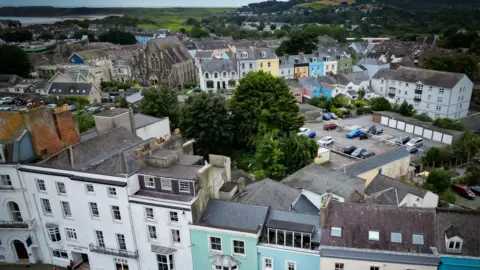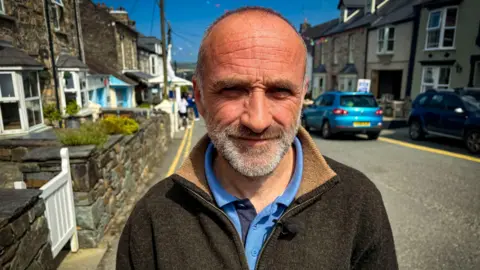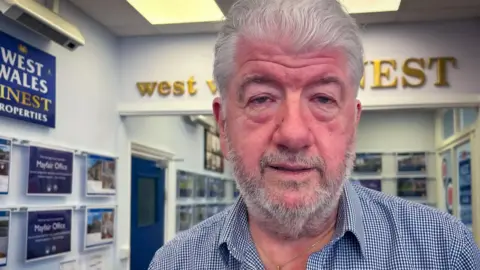 BBC
BBCThe number of second homes for sale in a Welsh county has trebled since council tax increased by 200%.
There were 135 Pembrokeshire second homes on the market in July, compared to 38 the previous year, latest figures indicate.
An estate agent said houses were going on to the market at the highest rate this century, and it was damaging the tourism industry.
However, campaigners pointed to the seaside town of Newport, where 30% of properties are second homes, and called for a legal act to give locals the right to buy.
New rules were introduced by the Welsh government with the aim of making it easier for people to afford homes in the area where they grew up.
To help achieve this, powers were given to local authorities to charge a premium of up to 300% on top of the normal council tax rate for those who own a second home in Wales.
It has become a thorny issue, especially in coastal areas and beauty spots along the west coast.
Cyngor Gwynedd has long been accused of “playing Russian roulette” by holiday home owners and tourism boards after it imposed a 250% premium on council tax for these properties.
Earlier this year, it went a step further and announced plans for any new second homes to be subject to planning consent, with these rules coming into force on 1 September.
It argued that the area faced a “huge housing crisis”, with many young people backing the move, saying wealthy second home owners were pricing them out of the market.
Other councils to charge a premium include Anglesey and Conwy, where the extra rate is 100%.
This is the same as Ceredigion – however, it will rise to 150% in 2025.
In Carmarthenshire, second home owners pay 50% more.
Pembrokeshire introduced a 200% council tax premium in April – tripling bills.
Owners can avoid paying the premium for up to a year by putting their homes up for sale.
The number of second homes on sale in the county as of 1 July was up by 97 in 12 months – an increase of 255%.
Council figures show there are now 3,271 properties registered as second homes, down from 3,364 in 2023.
Those listed as self catering holiday units have also dropped from 2,621 to 2,425.

Hedd Ladd Lewis, a campaigner for housing market reform, said the increase in the number of second homes on sale was “encouraging”, but questioned whether local people could afford them.
“What we have is an open market and local people who earn wages – on average around £28,000 a year – will not be able to compete [for houses],” he said.
He lives in Newport, where 30% of the properties are second homes or holiday lets.
“There is a huge injustice when it comes to the housing market and we need to see some sort of property act which will ensure that the local community has a legal right to a house,” he added.
But Neil Evans, the owner of West Wales Properties estate agents, said the council tax premium has had a “huge impact”, especially in places such as St Davids and Newport.
“We’re seeing properties come on the market at such a volume that I’ve never seen in 30 years,” he added.
“[Second home owners] can purchase a property on the other side of the Severn Bridge and have none of this.
“I think what we’re finding generally is that it’s affected the holiday trade as well.”

Emma Downey, who owns Tides Kitchen and Wine Bar in Newport, Pembrokeshire, said as well there being a high number of properties on the market, visitor numbers to the town also fell over the summer.
“People who have second homes here are desperately angry at the charges they’re now facing, and a lot of them simply are putting them on the market because they’ve had enough,” she told BBC Radio Wales Breakfast.
She said the town needed a mixture of local people, holidaymakers and second home owners “to enable us to run our businesses successfully”.
She also called for more affordable homes to be built to solve the housing crisis.
“What we certainly don’t want… are all these homes going on the market and sitting there empty. That is not going to help anybody,” she said.
Aled Thomas, a local Conservative councillor who opposes the premium, said: “Tourism is one of the things that brings money into the economy, but people are going out of business because of these policies.
“What we need to do is to build more houses.
“Only around 20 to 30 houses have been built by the council in the last 30 years and that is disgraceful.”
Pembrokeshire council dispute the figures from councillor Aled Thomas and have been asked to comment.

